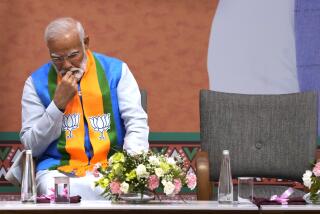Putin leads in this power dance
- Share via
MOSCOW — The question has all but disappeared from Russian discourse after months of feverish debate: Who is in charge, Prime Minister Vladimir Putin or President Dmitry Medvedev?
It’s been nearly a year since Putin, faced with the end of his presidency, endorsed his long-loyal underling to succeed him in the Kremlin. The speculation that once rattled around the capital after Putin restyled himself as prime minister -- whether the two men would clash, whether Medvedev would try to eclipse his onetime mentor -- has fallen away.
These days, there is a broad perception that Putin remains the dominant politician. Analysts variously describe Medvedev as a spokesman, a yes man or, more generously, a just-slightly junior partner in Russia’s vertical rule.
This is all gleaned from political body language, of course. Few can say with any certainty who gives the orders behind closed doors, and many Russians now argue that it’s an irrelevant question. In public, the two leaders operate in almost flawless tandem, as two complementary arms of the power structure built by Putin.
In the last few weeks, as Medvedev pushed parliament to prolong the presidential term and doled out steely threats to counter American plans for missile defense, he appeared even more Putinesque than Putin himself -- more hostile toward America, more enthusiastic about alliances with anti-American governments in Venezuela and Cuba, and less concerned with the niceties of constitutional preservation.
“Medvedev has made himself even more harsh,” said Lilia Shevtsova, an analyst with the Carnegie Moscow Center. “He’s following the logic of Russian power. He has to look macho and demonstrate his muscle, especially having Putin in the background, continuing to call the shots.”
It was Medvedev who, during his state of the nation speech last week, unveiled plans to change the constitution. Explaining that parliament and the Kremlin need “enough time” to “maintain a high level of authority” and carry out complicated development plans, he proposed lengthening the presidential term from four years to six, and service in the ruling-party-dominated parliament from four years to five. He also suggested giving parliament more power to oversee the government.
These are not fresh ideas. The proposed changes are a resurrection of a plan that was championed in the twilight of Putin’s presidency by some of his most ardent supporters, who pushed him to amend the constitution to stay in the Kremlin longer.
At the time, Putin demurred. The constitution was sacrosanct, he insisted, and should not be altered. Now it is Medvedev who is pushing the changes -- and Putin who’s staying in the background, while telling reporters he supports the amendments.
Some in Moscow speculate that the two men are laying the groundwork for Putin’s extended return to the Kremlin; Medvedev has made it plain that the lengthier term would not apply to his own presidency.
Others argue that it doesn’t matter which of the two men occupies the presidency.
“I don’t think the investigation into who’s the leader in this duet is relevant,” said Garry Kasparov, former chess champion and leading opposition figure. “The core message is both for a Russian audience and for the West. They’re saying: ‘We are staying. Forget about it -- we’ll decide between us who’s in charge.’ ”
The proposed changes carry undeniable gravitas, marking the first time the post-Soviet Russian Constitution has been amended since its adoption in 1993. But the amendments are racing through the usually laborious legislature: The first reading is scheduled to be heard this week in the State Duma, the lower house.
The changes are expected to meet little resistance in parliament, which is stacked with Putin loyalists. Still, some eyebrows have been raised even among his supporters.
Sergei Markov, a lawmaker in the ruling United Russia party, said criticism of the amendments as vehicles to harden Putin and Medvedev’s hold on power was “partly true, because really it’s an increase in power.”
“It’s a change in the constitution with unclear, uncertain purposes,” he said. “I think eight years is enough for any president to change the country. It’s all tactical, and that’s my major point of criticism. I think to change the constitution for some small, tactical things, it’s not too reasonable.”
Markov said Medvedev’s eagerness to change the constitution was rooted in uncertainty over shifting global dynamics, especially Russian wariness of America in the wake of Russia’s war with U.S.-backed Georgia. By ruling longer, he said, Medvedev hopes to create greater stability.
Medvedev has already signaled that he’s ready to play tough with Washington, threatening to deploy short-range Iskander missiles in the far-western-Russia enclave of Kaliningrad in response to U.S. deployment of a missile defense shield in Eastern Europe. He also has blamed the United States for the global financial crisis.
“These are initiatives of tandem rule, and the continuation of Putin’s paradigm of rule,” Shevtsova said. “This is a ruling corporation, and within this corporation they can change hats.”
Stack is a Times staff writer.
More to Read
Sign up for Essential California
The most important California stories and recommendations in your inbox every morning.
You may occasionally receive promotional content from the Los Angeles Times.













